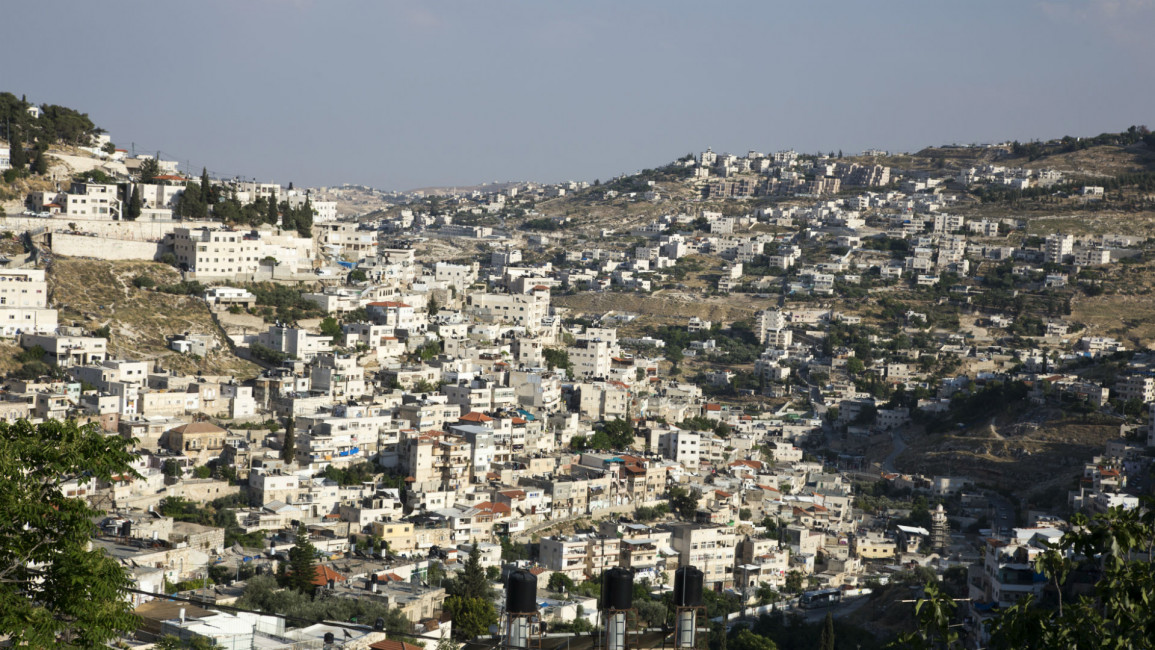
Palestinian concessions in draft resolution mark a new low
Palestinian concessions in draft resolution mark a new low
Concessions on Jerusalem, settlement building and more show the Palestinian leadership has caved in to international pressure. That can only invite more.
3 min read
The draft resolution ignores that East Jerusalem is an occupied area [AFP]
There are numerous problesm with the Arab-Palestinian draft resolution that was submitted to the UN Security Council this month.
It was created by a few people from the presidential office’s inner circle. The resolution was shrouded in secrecy and mystery. Repeated demands to see a copy were ignored, and many Palestinian Authority officials saw it for the first time when it was officially published on the UN website after it had been formally submitted to the Security Council.
It was created by a few people from the presidential office’s inner circle. The resolution was shrouded in secrecy and mystery. Repeated demands to see a copy were ignored, and many Palestinian Authority officials saw it for the first time when it was officially published on the UN website after it had been formally submitted to the Security Council.
The summary of the resolution Palestinian President Mahmoud Abbas hapressented at Palestinian Authority meetings was almost unrelated to the final text submitted.
| The submitted text showed the official ceiling of demands was at its lowest level since the Oslo Accords were signed. |
There were high hopes about the draft resolution. But the submitted text showed the official ceiling of demands was at its lowest since the Oslo Accords were signed. This was because the submitted draft introduced unprecedented concessions in and it sparked widespread discord among the Palestinian leadership.
The most prominent criticism came from Hasan Asfour, a long-time member of the Palestinian negotiation team in the Oslo process. He described it as a national political catastrophe that constitutes an official Palestinian reversal of UN resolution 67/19, adopted in 2012, which recognises Palestine as a non-member observer state at the UN, with East Jerusalem as its capital.
Asfour further believes the draft resolution puts the Palestinian leadership on a collision course with all national movements, from the right to the left, secular and Islamist, progressive and conservative.
It is clear that in trying to avoid a US veto, the Palestinian leadership has made basic concessions and lowered Palestinian demands to a new low. The text that called for a complete end to all settlement building activities on Palestinian lands occupied in 1967 including East Jerusalem, has been replaced with another that calls on both parties to refrain from taking any "unilateral and illegal" action, including settlement building, that could damage the two-state solution.
The new text also ignores Jerusalem and excludes the city from the area where settlement building is to be stopped. The draft includes settlements that impede the geographic continuity of the Palestinian territories, however it does not talk about settlements on lands occupied in 1948, including major settlements in Jerusalem and the surrounding area.
East Jerusalem was designated as the capital of the Palestinian state in the original text, but it was replaced by text proposing that Jerusalem becomes a "shared capital". This completely ignores the fact that East Jerusalem is an occupied area that should be liberated and leaves the door open to multiple interpretations of the where the boundaries lie for the Arab side of Jerusalem.
Like all Palestinian political literature, the original text of the resolution called for Israel to retreat from all the land it occupied in 1967. However, the resolution submitted to the Security Council called for an end to the occupation "based on 4 June, 1967 lines" . This means the focus is on both sides agreeing on what this basis is, rather than on any historical, legal and international standards.
Other articles were changed, altered or even omitted from the original text, For example, the demand for Israel to stop its military operations, its reprisals and its forced displacement of civilians.
Despite all these concessions there is a serious possibility the resolution will be postponed until after the Israeli elections in March 2015, and that additional pressure will be exerted on the Palestinians to secure more concessions. This could mean including the recognition of Israel as a Jewish state.
The only result achieved by submitting the draft resolution was that the ceiling of Palestinian demands reached a new low.
This article is an edited translation from our Arabic edition.



